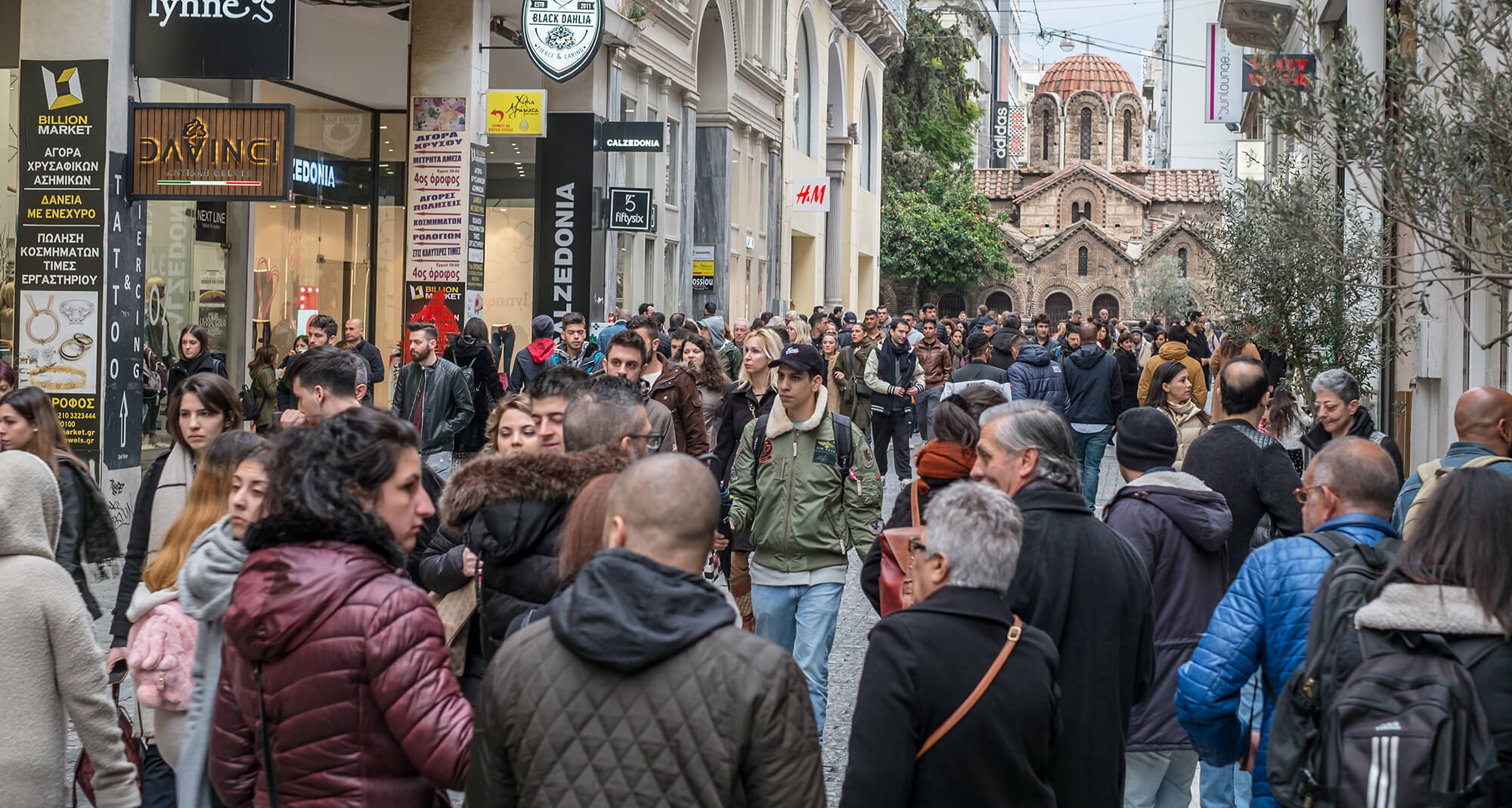What do Greek people think about the major threats endangering the future of their country and the world? What are their views regarding Greece’s role in the European Union, as well as on immigration and sexual harassment? How have their opinions shifted in the aftermath of a severe economic crisis, a global pandemic, and a war being fought on European soil? "What Greeks Βelieve", diaNEOsis’ major survey about the values and opinions held by the Greeks on a wide range of important issues, is back with important new findings. It is the sixth "wave" of an initiative launched in 2015, at the height of the economic crisis, with the aim of recording the positions of Greek citizens -i.e., the backdrop against which our organization proposes solutions and reforms. These seven years have been particularly eventful, and these surveys have vividly captured how the Greeks have responded to the unprecedented crises and seismic events which have shaped our troubled times.
The new survey, which was assigned to the research company MARC S.A., was conducted in two parts on a representative sample of the general population aged 17 and over, using telephone interviews and an online panel. For the first part of the survey, whose findings are summarized below, the team reached out to 1,255 people in the period between 3 and 18 February 2022. The fact that, in the meantime, the Russian army invaded Ukraine causing the ensuing military conflict, led us to do a short follow-up survey, conducted between 10 and 13 March, asking five of the questions given back in February again. The findings of this follow-up survey are also presented here (in Greek). The second part of the survey was conducted between 26 January and 5 February 2022, on a similar sample made up of 1,254 people. A discussion of those results can be found here (in Greek).
You can read the answers the participants gave during the first part of the survey as well as in the follow-up survey in this PDF file (in Greek), together with tables presenting the participants’ answers divided per population group. All datasets can be found in this file (also in Greek), and they are open and accessible to all. An accompanying report discussing the findings, prepared by the founder of MARC Thomas Gerakis, can be found here (or here in PDF format -again, in Greek). In addition, we have published two expert analyses presenting supplementary findings of particular interest, written by Panagis Panagiotopoulos, Associate Professor of Sociology at the University of Athens (EKPA); and by Marina Economou-Lalioti, Professor at the First Psychiatric Clinic of the University of Athens. They are also available in Greek.
Below, however, you can find an overview of the survey’s main findings. In English.
1. Emotional responses, Threats & Dangers
The survey, as argued by Thomas Gerakis in his accompanying report, "was conducted in a period during which preexisting insecurities and threats were gravely amplified". "In that sense, the survey offers valuable insights," Panagis Panagiotopoulos notes in his own report, "which do not merely reflect the dispositions and perceptions held by the public at any given moment, but also the cumulative impact of the multiple crises which have shaken the Greek society in the last few years".
At this juncture, perhaps unsurprisingly so, the feelings that are most prevalent among the Greeks are "insecurity" (28.8%) and "disappointment" (28.5%). "Optimism" has suffered a significant drop (from 23.4% in 2019 to 13.7% this year). "It is undeniable that the pandemic has had a negative psychosocial impact on the population, in Greece as in the rest of the world," Marina Economou-Lalioti writes in her accompanying report. "In Greece, however, at the beginning of the pandemic, the citizens were already burdened by the strain of the preceding economic crisis, which had also caused disruption, instability, insecurity, and loss of symbolic capital. The pandemic shook the Greeks even more vigorously, leading them to confront more primitive threats, such as the loss of human lives and the concept of death, but also activating primitive fears, instincts, and traumas which the previous crisis had left unaffected".
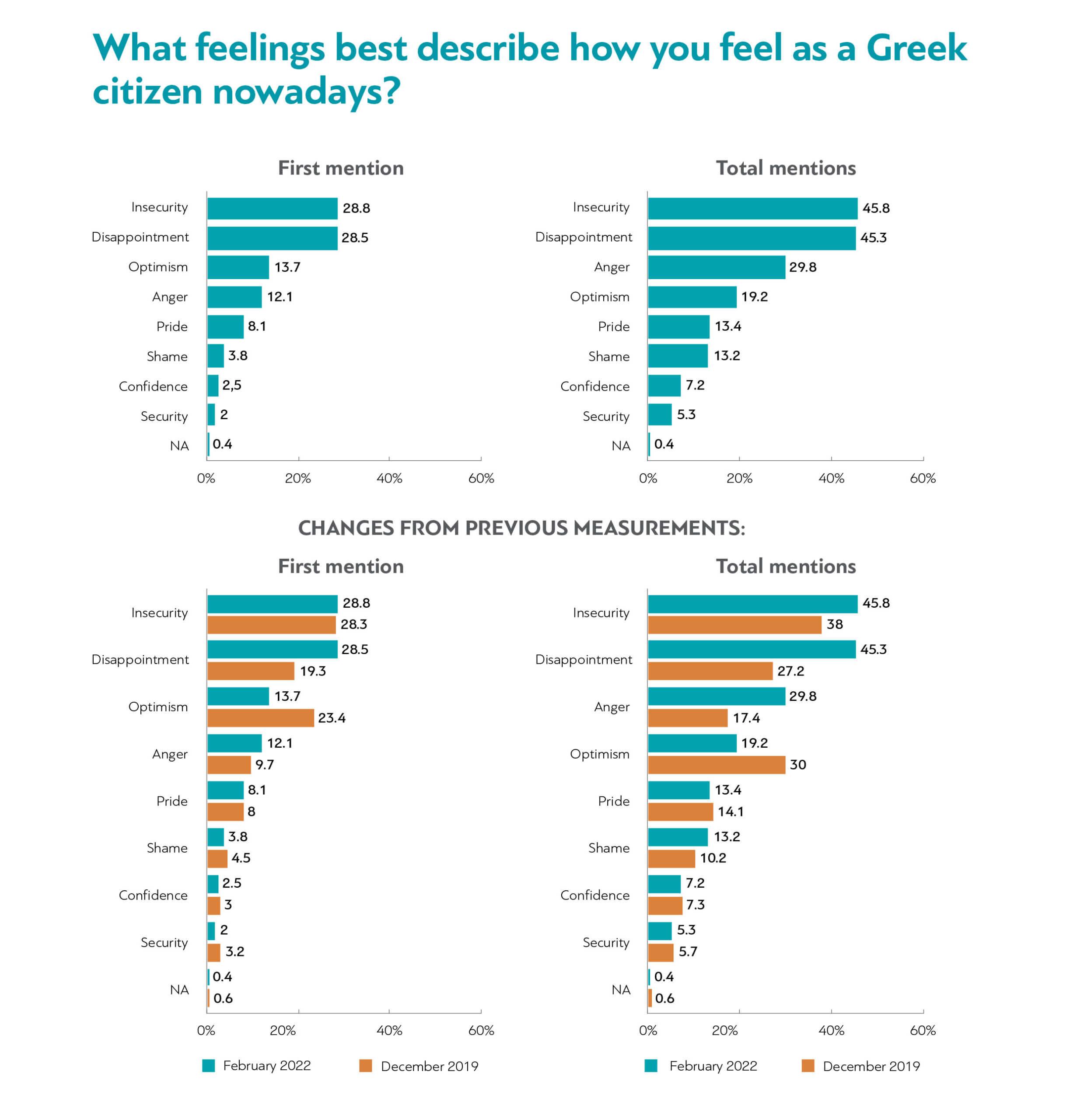
As is often the case in surveys of this type, reported emotions vary depending on the population group each person belongs to. For example, respondents who stated that their monthly personal income "exceeded €3,000 per month" were also the ones who reported the highest percentage of optimism (27%) -optimism was the most common emotional state for this group.
In another question, the greatest threat Greeks see for the future of their country is the "demographic decline", with Greek-Turkish relations and the country’s economy coming next. Interestingly, in 2022, 9% of respondents thought that the greatest threat Greece is currently facing is "immigration", down from 21.7% who had thought so in 2019. Despite the fact that Covid-19 was still claiming dozens of lives on a daily basis at the time that the survey was conducted, only 2.2% of respondents answered that "diseases and pandemics" were the number one threat to Greece. Which group considers the demographic issue as a less imminent danger? Young people aged between 17 and 24 place the danger of immigration on a par with "terrorism".
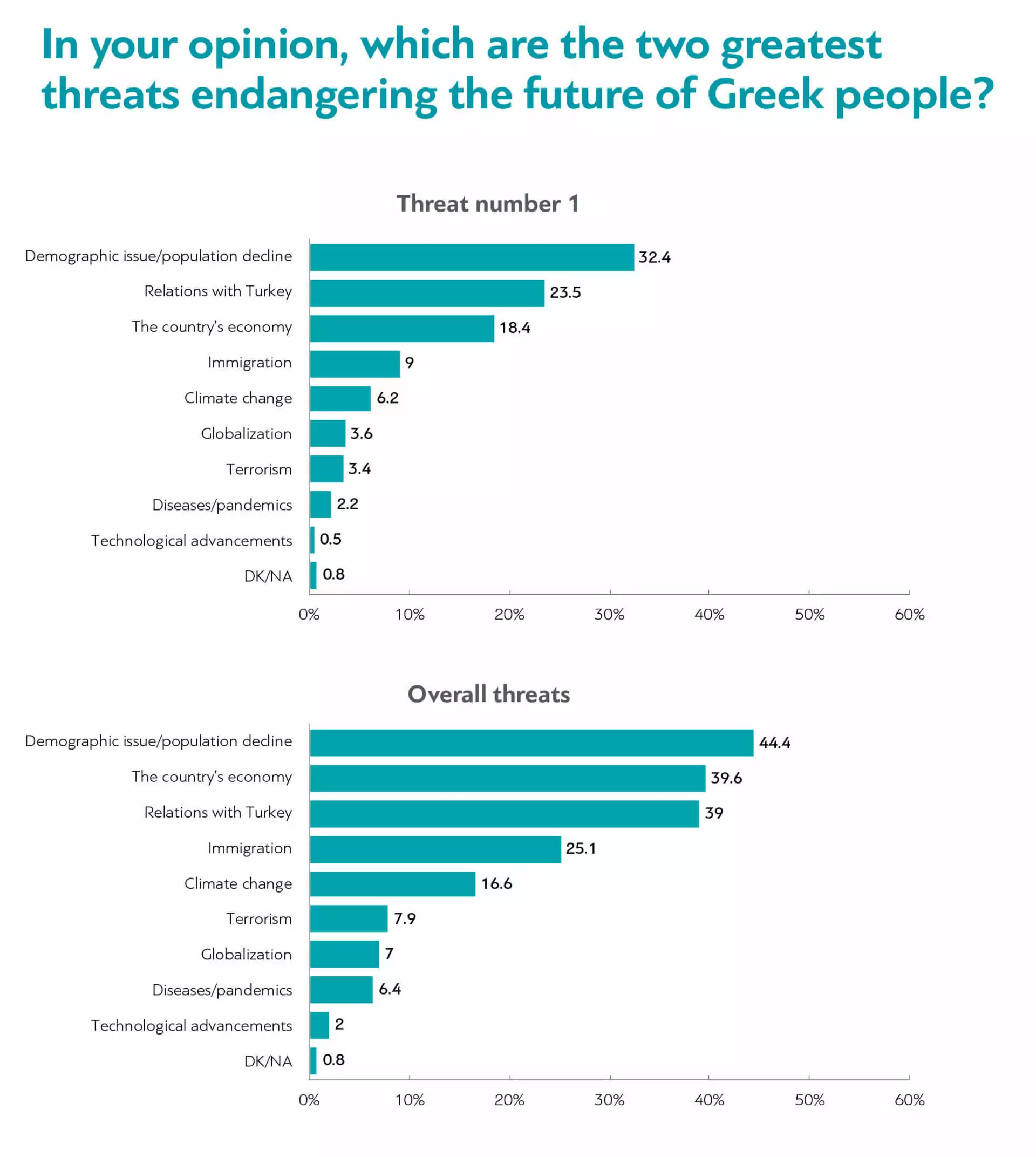
On a global level, however, most Greeks now see "war and conflicts" as the greatest threat the planet is currently facing (33.2%). On this point, the results have changed dramatically in a matter of a few weeks -it was one of the questions we repeated in March 2022, after the Russian army invaded Ukraine. In February 2022, when we had asked the same question, only 13.3% had ranked war as the number one threat -the majority (31.6%) had identified climate change as the greatest danger for humanity, with "economic inequalities and difficulties" coming in second place.
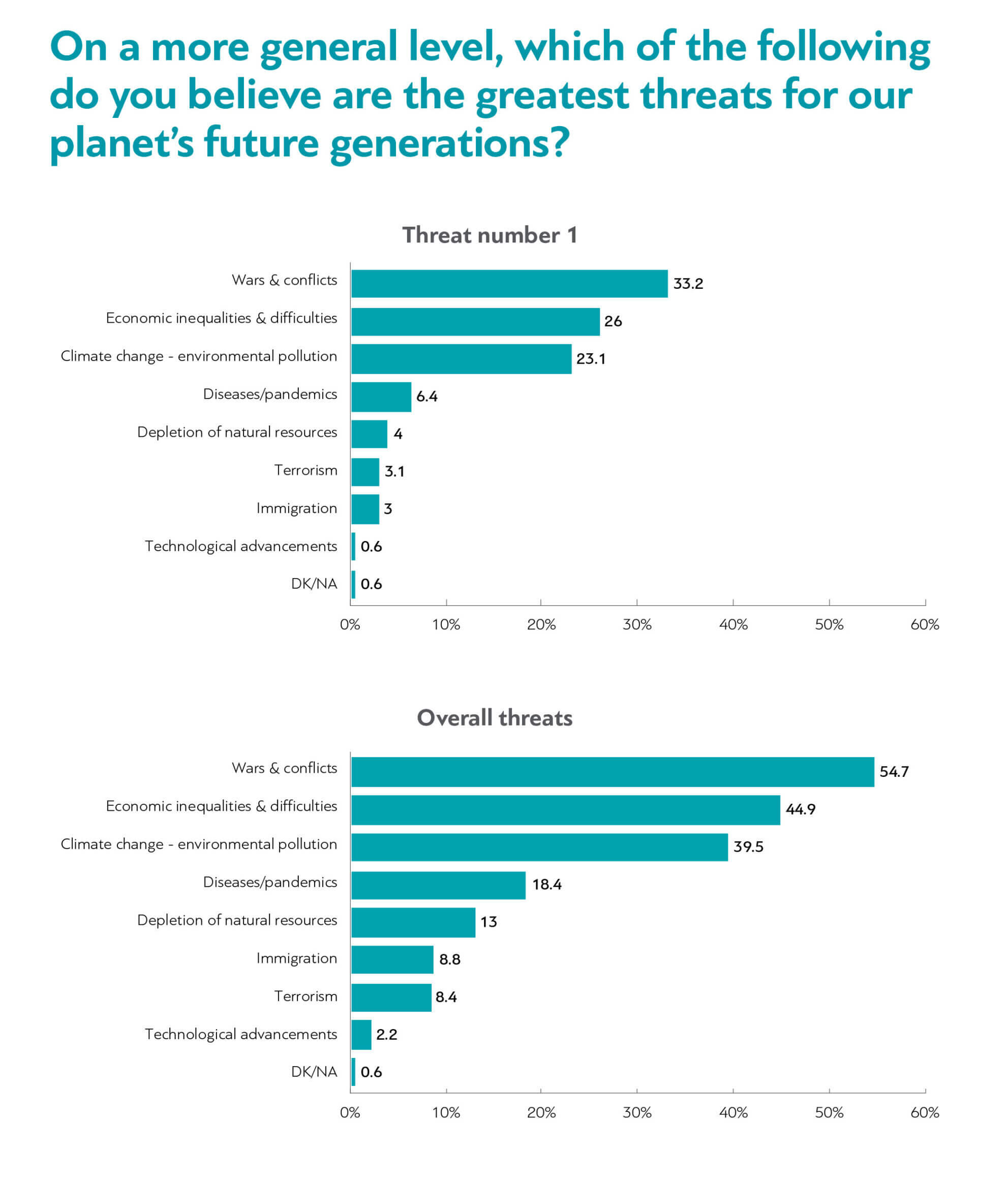
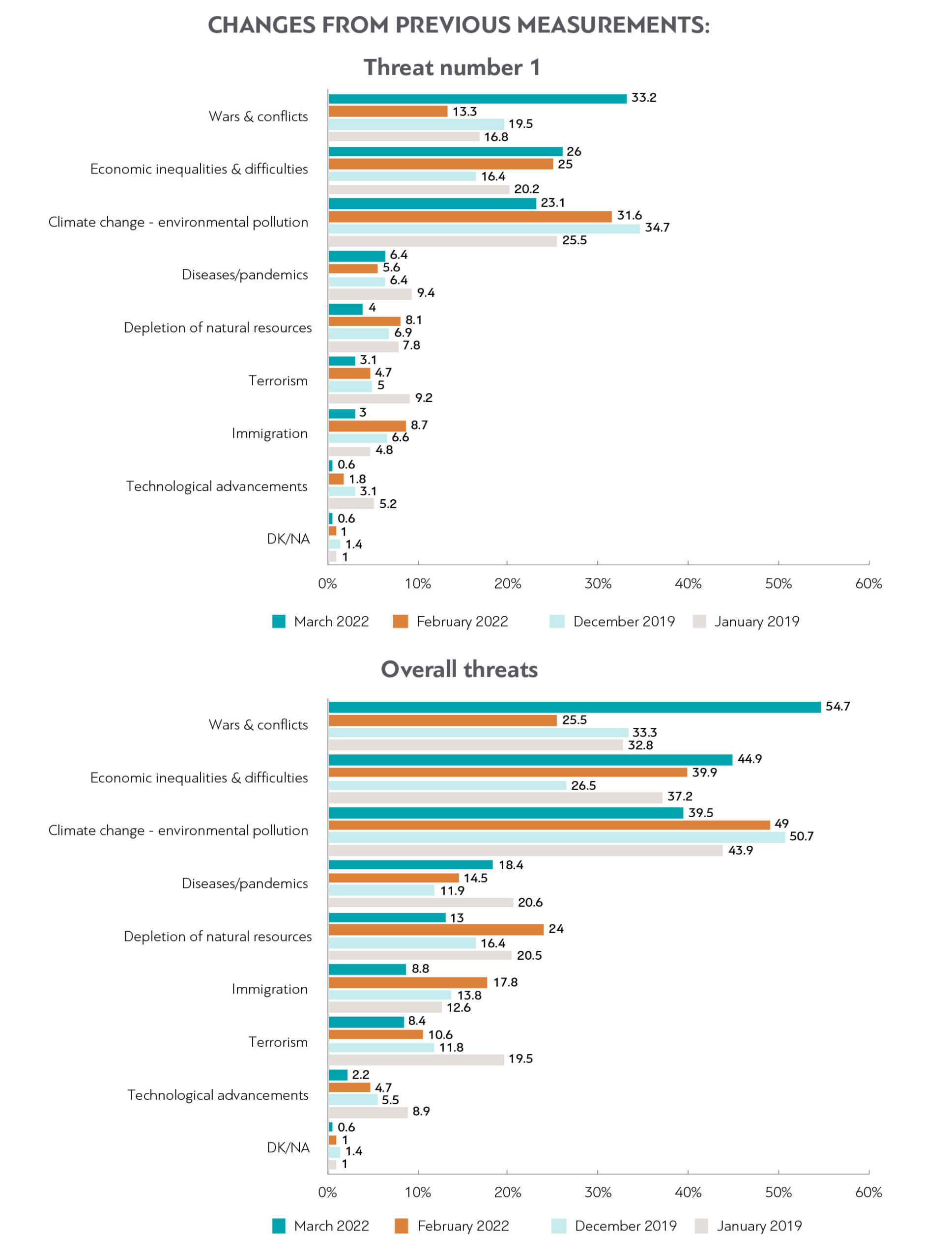
People's attitudes have also shifted in other ways since the beginning of the war in Ukraine. Even though these changes are likely circumstantial and transitory, they are, nonetheless, of great interest, if only as a means of tracing the influence of exogenous factors on the attitudes of respondents.
For example, we asked people to tell us whether eight words describing a person's ethnic or religious identity, or referring to some trait characteristic of their situation, evoke something "good" or "bad" to them. In March, the majority assigned a "bad" connotation to the words "Turks" (60.3%), "Muslims" (47.9%), "Germans" (48.4%) and "migrants" (42.8%). The participants viewed the "Americans" (49.3% considered them as "good”), "Jewish people" (46.3%), "refugees" (55.4%) and "Russians" (48.7%) as more "good" than "bad". It is in the last two categories that a considerable change has been observed since the outbreak of the war. Before the war, at the beginning of February 2022, the percentage of respondents who were positively disposed towards "refugees" was 47.1% (up from only 40.6% in 2019). Similarly, 58% of respondents answered they view the Russians as "good" back then. It is worth noting that this figure was already significantly lower than the 77.4% recorded in 2016. As T. Gerakis notes in his report, "this is the first time that the Greeks are, however marginally, more positively disposed towards the Americans than towards the Russians".
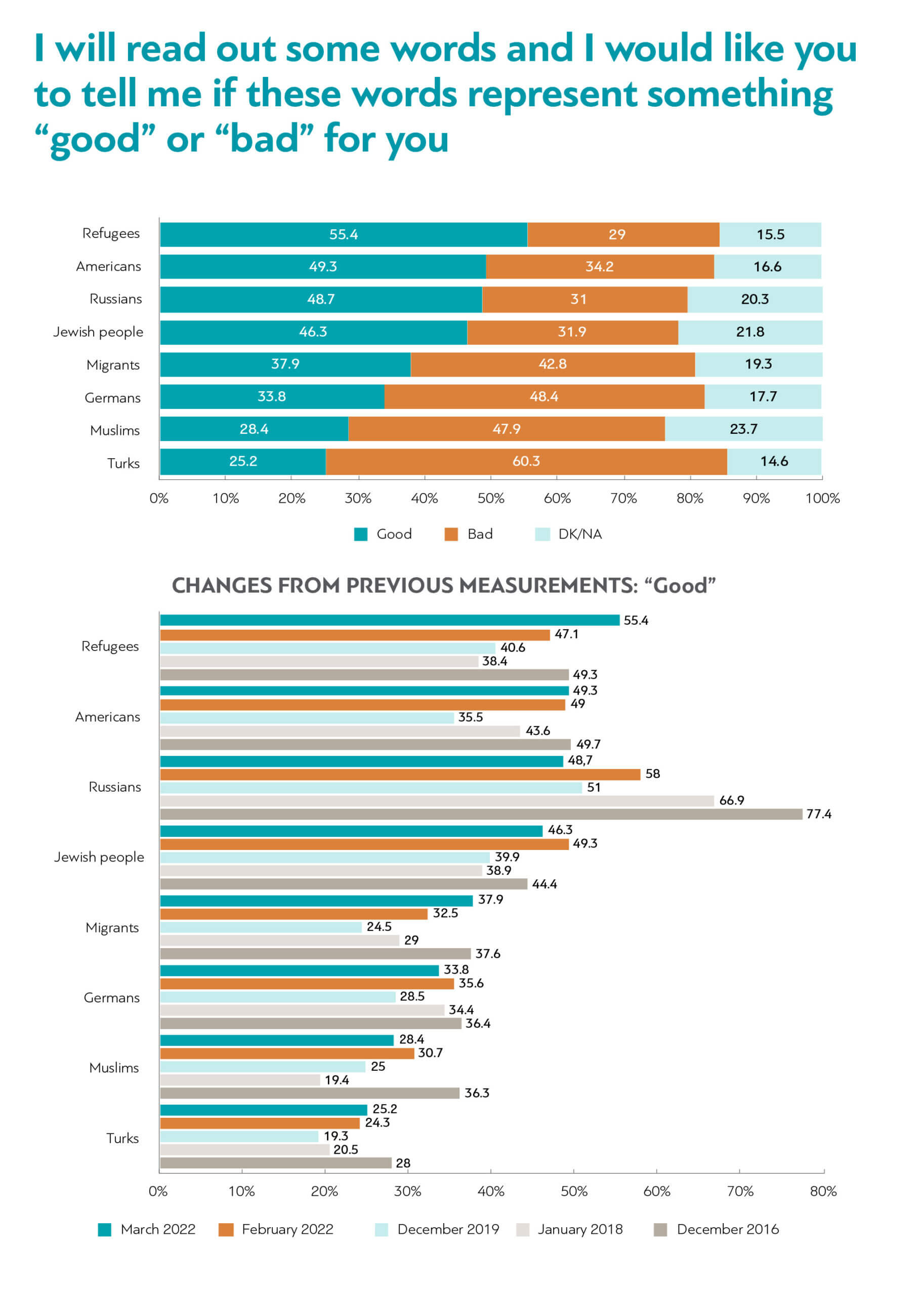
Moreover, in March 2022 we repeated a question we had asked in our December 2019 survey, tracing Greeks’ views on several international personalities. Within this period, the positive opinions about French president Emmanuel Macron soared from 48% to 65.1%. Thus, in the 2022 survey Macron becomes the only international figure to garner more positive than negative responses from the Greeks. As expected, the attitude towards Vladimir Putin is the one presenting the greatest shift. In December 2019, 41.3% of the Greeks held a favorable view of the Russian president. In March 2022, only 18.8% of respondents stated they are positively disposed toward him. The only leaders the Greeks view even less favorably are Angela Merkel (70.2% negative views) and Tayyip Erdoğan (89.9%). A point worth noting is that more than half of the Greek population either don’t know or haven’t formed an opinion about Chinese president Xi Jinping.
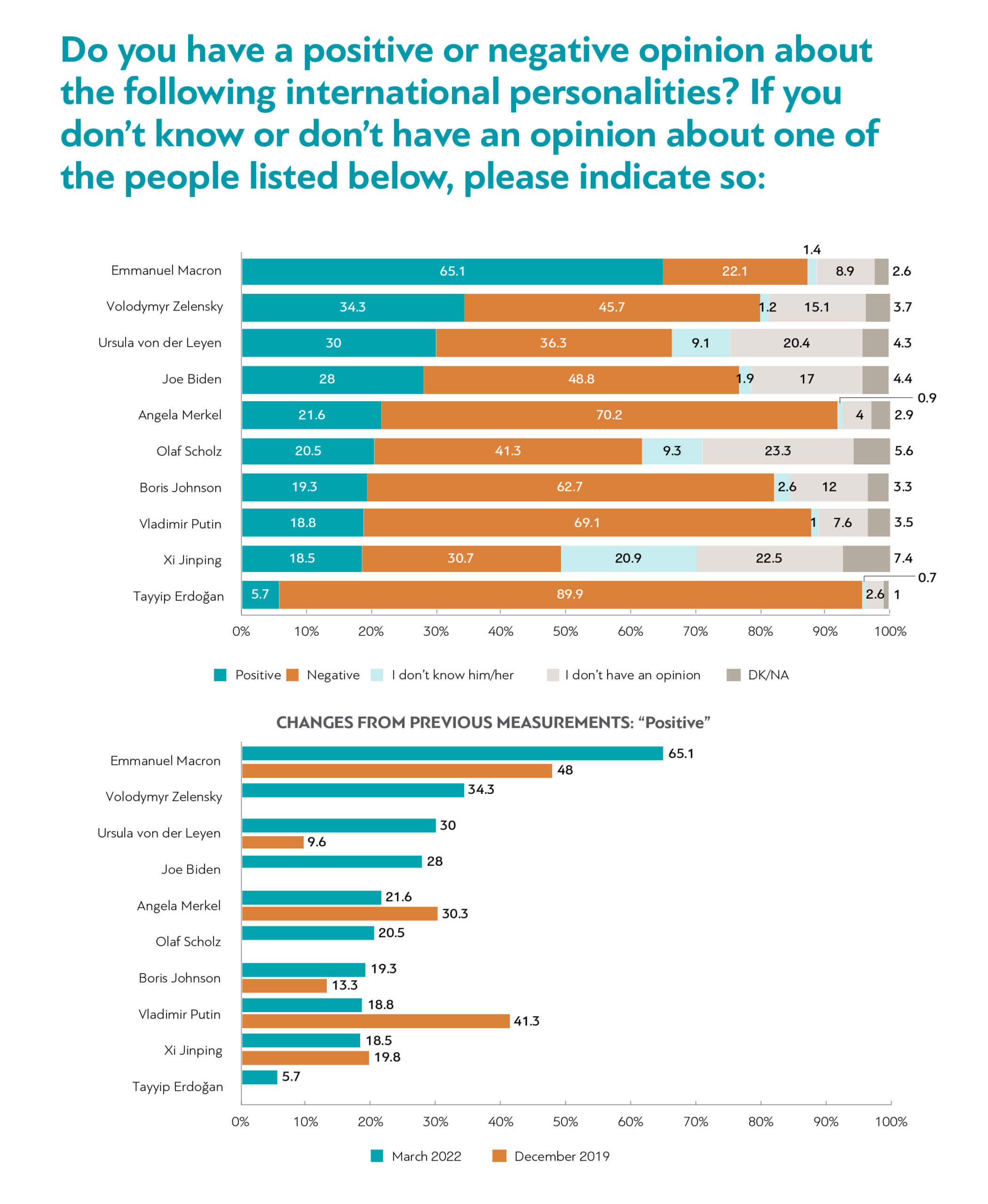
Another interesting finding related to the perception of international threats is reflected in the question "Which of the following countries are Greece’s closest allies in foreign affairs". To this question, there is one answer which clearly prevails over the rest. It should be noted that the question was asked shortly after the finalization of the agreement for the supply of high-value defense equipment by France, which had been preceded by supportive initiatives led by the French president in response to a turbulent geopolitical period in the eastern Mediterranean. As a result, when asked to cite Greece’s closest ally at the present juncture, 64.9% of the Greeks surveyed chose to name France. Moreover, Greeks rate the US and Israel as the country's "second best" allies –albeit by a very wide margin. In this area, another shift is noted since the war in Ukraine broke out: the percentage of Greeks who consider Russia as one of Greece’s two closest allies has been halved (from 15.2% to 7.5%).
How about the threats the Greek people considered to be the most significant at the time of the survey? As always, Greeks stated that they worry over the impact of climate change on their lives -possibly an aftermath of collectively experiencing forest fires and extreme weather conditions of increasing frequency and intensity. 43.8% of Greek people believe that "climate change negatively impacts their lives in the present", while 45.2% think that it will "negatively impact their lives in the future". Comparing the above figures with those of previous surveys, we see that in recent years there has been a gradual shift, with the first answer steadily gaining ground over the second to the point of becoming the majority view (in 2018 the equivalent figures were 39.5% and 52.8% respectively). Over time the percentage of Greeks who believe that climate change poses no threat at all remains stable in low, single-digit numbers.
Concerning the pandemic, Greek society seems to have settled into a more pragmatic approach. In February 2022, 81.5% of respondents stated that they had taken at least one dose of the Covid-19 vaccine (it was 93.3% for those aged over 65), with less than 10% replying that they did not intend to be vaccinated. More than half of the Greek population now estimates that Greece will leave the pandemic behind it and return to a "normal everyday life" at some point in 2023 or later.
2. Rights & civil society
A major force of change affecting Greek society within the last few years (since the last edition of the "What Greeks Believe" survey) has been the #metoo movement, as a result of which the issue of sexual harassment and gender violence has entered the public debate. In 2022, 87.8% of respondents said that they consider the problem of sexual harassment "very" or "moderately" widespread, up from 64.2% who had stated the same in 2018. The number of people who considered the problem "very widespread" has in fact doubled within this period (from 25.6% to 48.4%). This is an issue on which all segments of the population agree, regardless of educational background, geographic location, economic means, or other criteria.
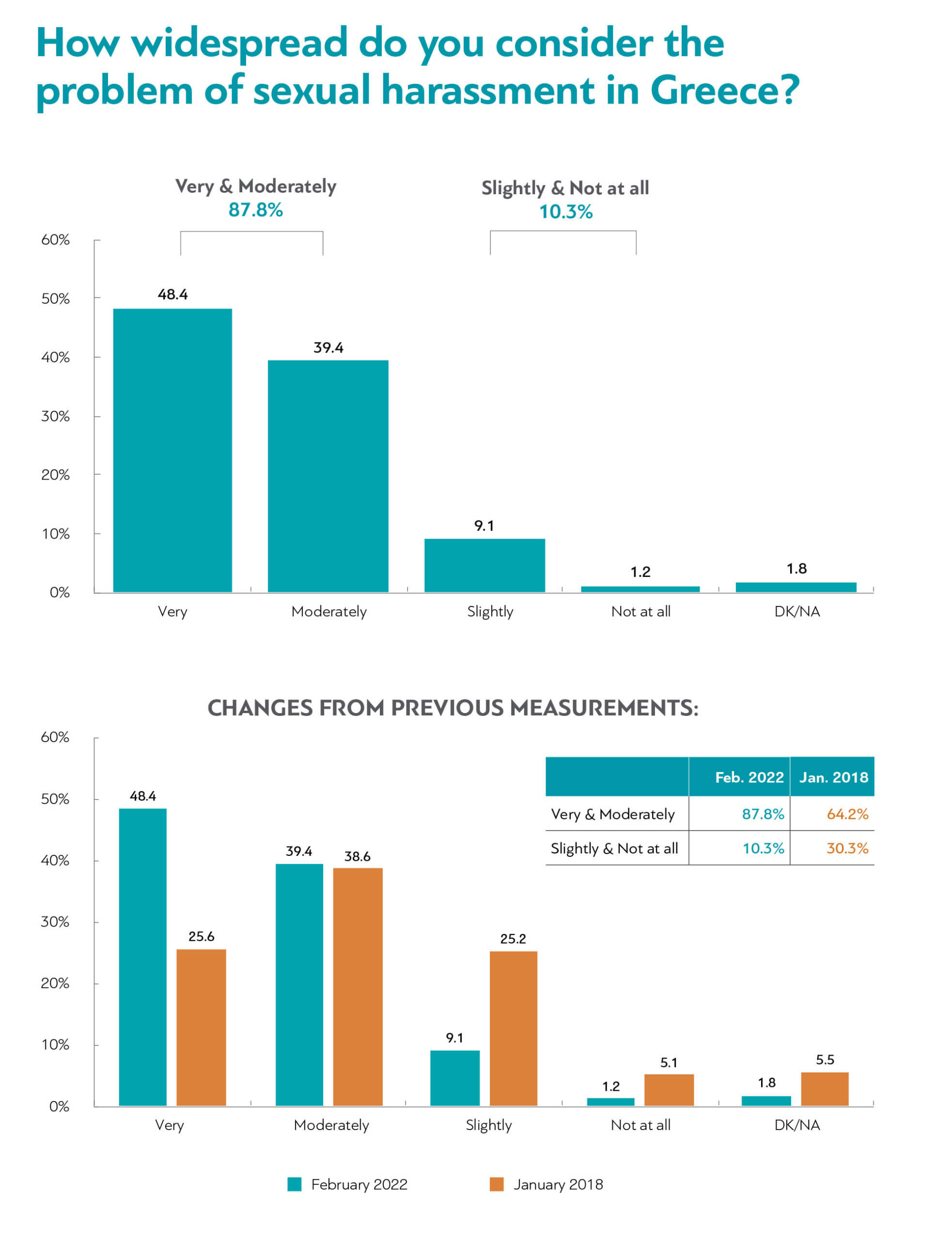
Most of the respondents (59.1%) believe that there have always been incidents of violence against women, but that they are now becoming more prominent in the public debate, with a far from negligible 39.6% stating that there is indeed an increased likelihood of such incidents happening today.
More than 1 in 4 Greek men and women report that they have been sexually harassed. Among those, 42.2% say that the person who harassed them was a friend/acquaintance or a colleague, 11% a relative, 24.6% a superior at work, and 40.5% a stranger. However, there would be little value in using these figures to draw conclusions about the general population, as this is a phenomenon affecting more than thrice as many women as men. Almost half of all Greek women say they have been sexually harassed (43.4%) and the same is true of about 1 in 8 men (13.1%). "This double acknowledgment", P. Panagiotopoulos writes, "of gender violence as an integral part of the Greek context as well as of the harassment endured by both women and men sends a strong message that the Greek society is, on the one hand, ready to participate in the new women emancipation wave unfolding on a global level and, on the other hand, willing to place individual autonomy above all prejudices linked to national priggishness or social conventions".
At the present juncture, in 2022, the majority of Greeks believe that same-sex marriages should be allowed (51.7% "moderately agree" or "agree"). It is the first time this happens since we first started including this question in our surveys (in 2016). In addition, the number of Greek people who agree that same-sex couples should be allowed to adopt has risen from 23.2% in 2019 to 38.9% in 2022. The majority (60.2%, up from 48.1% in 2019) also agree that a person’s gender identity should be legally recognized. In this cluster of results too, age, education, and income are factors impacting the answers of respondents. 2 out of 3 Greek students approve of same-sex marriage. Approximately 6 out of 10 students also believe that same-sex couples should be allowed to adopt.
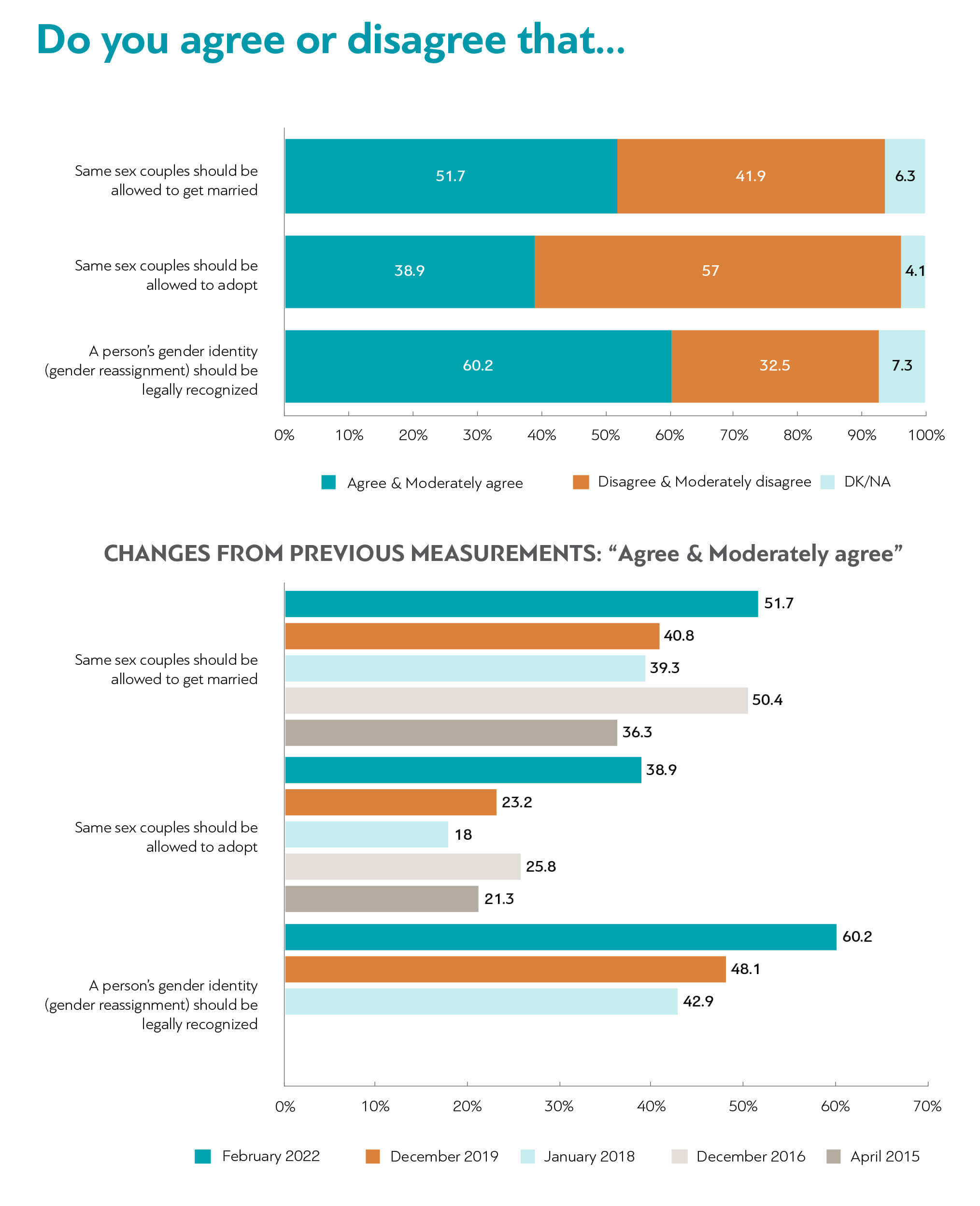
In 2022, most Greeks continue to believe that children born in Greece by parents who are legal immigrants should be granted Greek citizenship (59.1%), although this figure is significantly lower than its 2015 equivalent (75.2%). Here too, the agreement is higher among the youngest age groups, students, those on the left of the political spectrum, and the affluent, while disagreement was higher among participants politically identifying with right or far-right parties. With the exception of the shift noted in the reception of the word "refugee", in all other questions relating to migration the Greeks continue to maintain a negative stance. 64.1% of the people interviewed believe that Greece should adopt a "stricter" policy line when it comes to managing migration flows.
Moreover, in the Greek society of 2022, almost all Greeks (90.7%) believe that "penalties for serious crimes or for crimes causing serious or permanent injuries" should be more severe.
What is more, half of the Greek population (51%) believes that the death penalty should be reintroduced for certain crimes. This finding is similar to findings in other relevant surveys in other European countries (e.g France). It is worth noting that the death penalty ban is a key pillar of the EU's acquis communautaire and is also mentioned in the European Convention on Human Rights. Nonetheless, the views steadily expressed in a great number of surveys conducted in several European countries is in itself a finding that is both telling and useful.
Finally, when we asked which, in their opinion, are the 3 most significant problems young people in Greece are confronted with today, three were the issues -all three related to financial matters- which attracted most of the responses: unemployment, low salaries as well as job and pension insecurity. In itself, this finding is not surprising. What is, however, interesting are the differences that emerged between responses given by different age groups. The participants who were themselves aged between 17 and 24 responded slightly differently: in addition to unemployment and an uncertain economic future, they placed "lack of opportunities" and "poor mental health" (cited by 38.9% of respondents) very high on their list of problems. Among respondents aged 25-39, mental health was cited by 25%. The 65+ age group considered unemployment a major problem for Greece’s youth (74.4%), but mental health was mentioned by only 8.9%. The discrepancies here are indeed worth noting.
3. European Union
After what turned out to be a short-lived break -at the height of the 2016 economic crisis- the assessment of Greece’s participation in the EU seems to have returned to its normal, pre-crisis levels: 2 out of 3 Greeks assess the country’s EU membership as something positive or moderately positive (64%) and only 1 out of 3 disagrees (34%). In addition, most Greek citizens continue to assess positively Greece’s participation in the Eurozone (60.1% versus 37.1%), with the percentage of those estimating that the country should remain in the EU being even higher (74.6%). At the same time, only 28.3% of Greek citizens believe that "the country should leave the EU". It is perhaps worth noting that while 28.3% of respondents thought that Greece should leave the EU, only 20.1% stated that their country should also leave the Eurozone. What this means is that a small number of our fellow citizens think that we should no longer be part of the EU but continue using the euro as our currency.
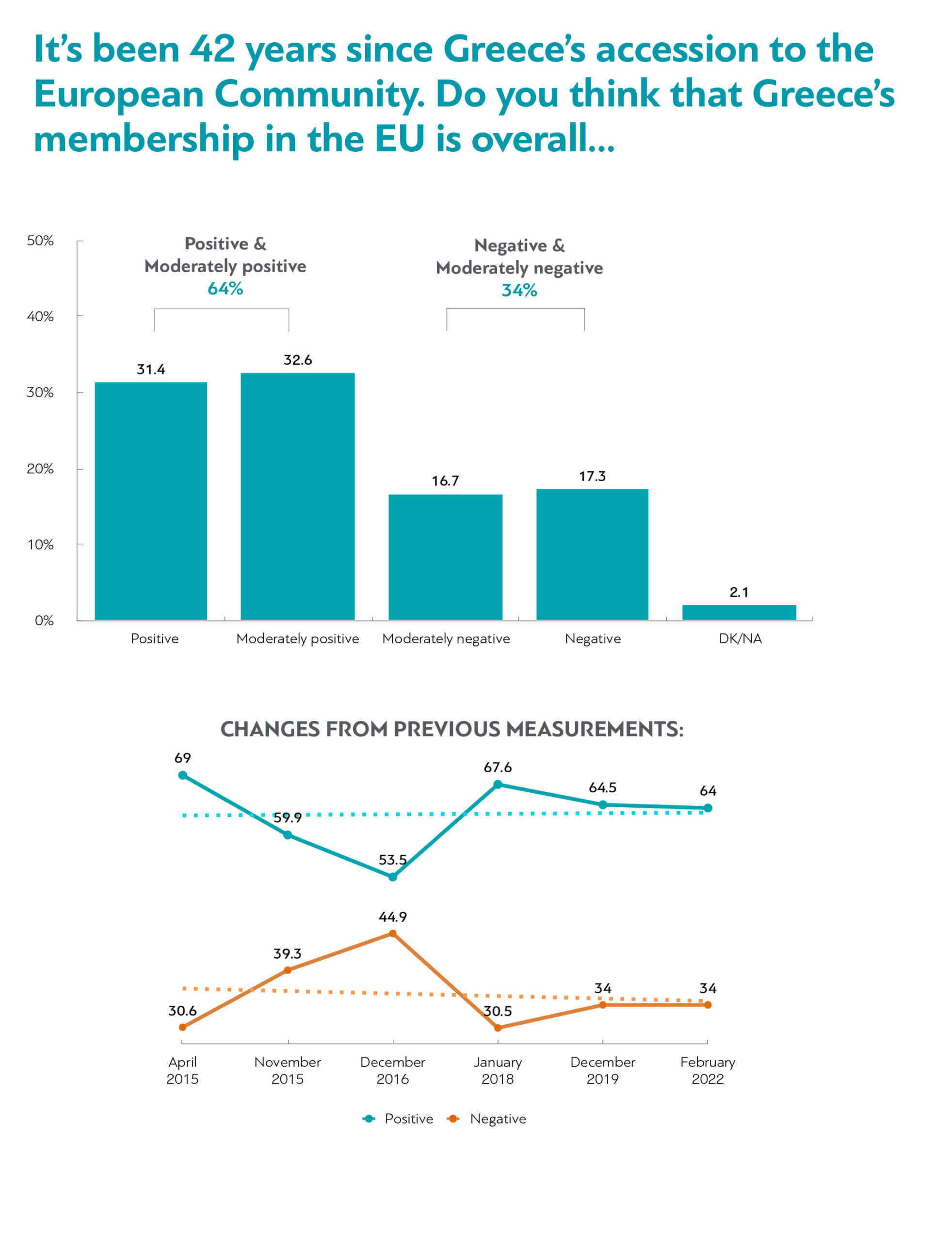
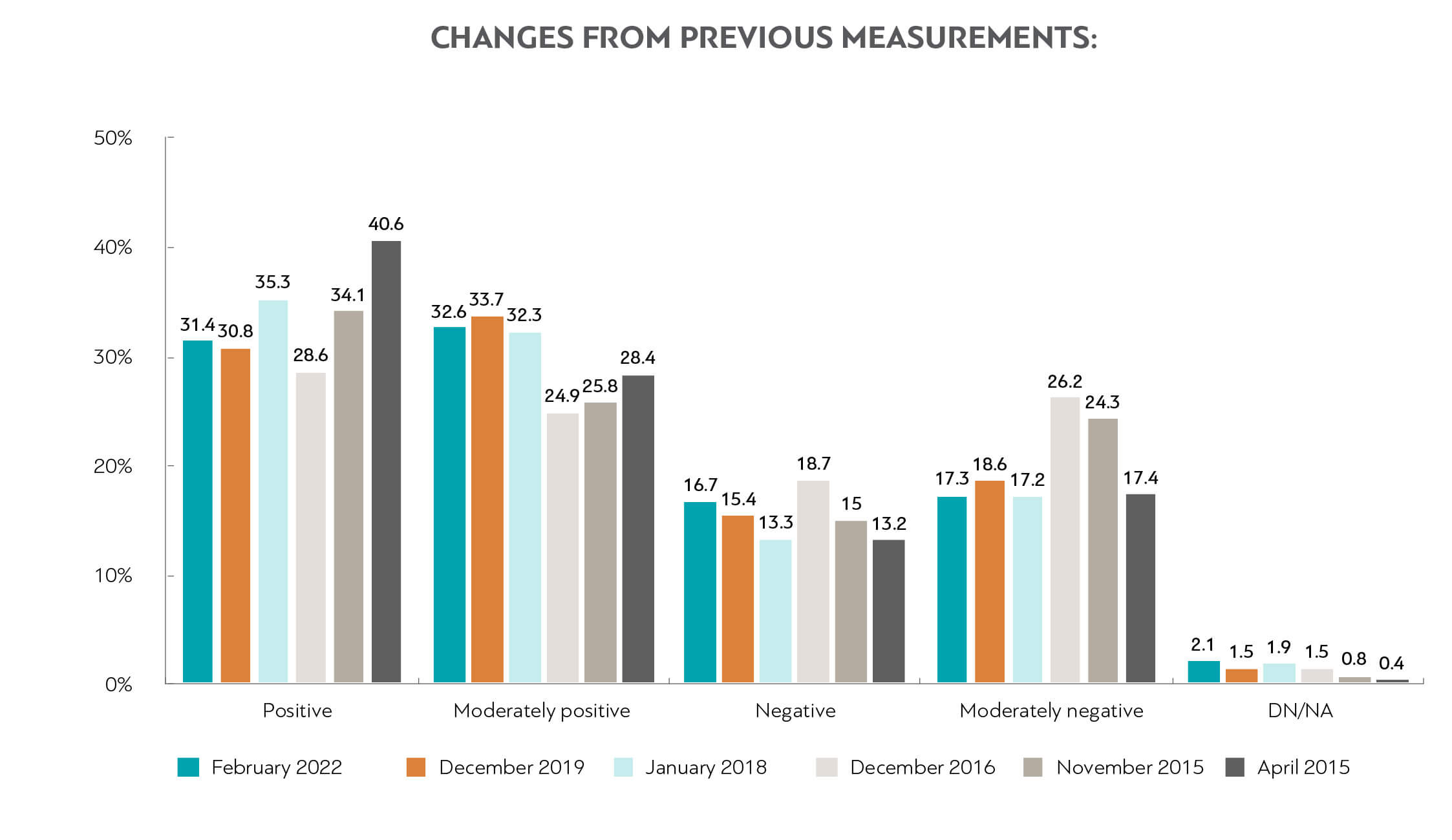
Concerning the future of the European Union, most Greek citizens are much more optimistic than they were in 2016. Back then, only 1 out of 5 people thought that the EU will grow into a "more integrated confederation of states" or even continue to exist in its current form. Today, 46.1% of the people interviewed believe that one of these two scenarios will come to pass. 1 out of 3 (34.5%) respondents states that the EU "will break up, with some countries leaving" (down from 49.5% in 2016), and only 11.8% that it will be dissolved (down from 27.9% in 2016).
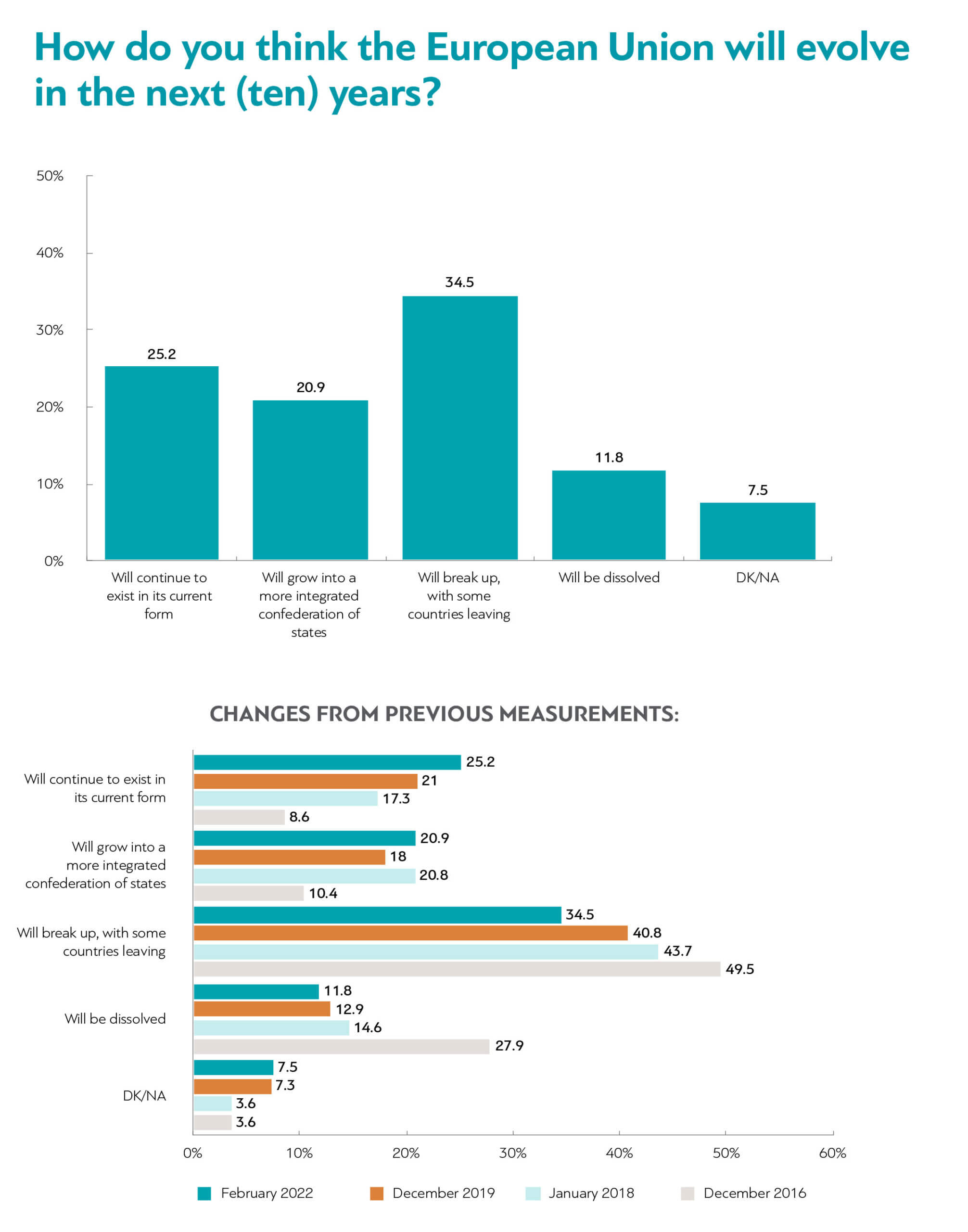
It is perhaps worth noting here that, although pro-European views are prevalent in almost all population groups, relatively more negative opinions vis-a-vis the EU were expressed by the 25-39 age group, i.e., by young people who, when the financial crisis hit, were between 13 and 27 years old. In this age group, 41.2% of the people interviewed believe that the country "should leave the EU", compared to 28.3% in the general population and 29.9% in the 17-24 age group. In other questions too, the age group 25-39 carries slightly more "anti-EU" opinions, compared to other age categories.
Overall, these findings suggest that since the crisis reached its peak in the middle of the previous decade, the image of the EU has returned to its pre-crisis levels of acceptance. It would appear -given that the previous "What Greeks Believe" survey was published just before the outbreak of the Covid-19 pandemic- that the pandemic has not impacted the Greeks' overall views regarding the EU either positively or negatively (although 56.5% of respondents stated that "the role of the European Union in managing the pandemic" was "positive" or "moderately positive"). It remains to be seen whether the war in Ukraine will have a more profound impact; and, if so, in what direction.
However, as is well known the EU is not a federation. In several policy areas -for example, education, health, defense, and foreign policy- the EU has no jurisdiction, and decisions lie solely with each individual member state. We asked the Greek citizens if they believe that in these areas the jurisdiction of the EU should be expanded so that decisions are no longer the exclusive prerogative of each member state. The answer was a resounding "yes to everything". What is more, in the March survey all figures were slightly higher than the ones recorded in February. "A deepening of the European integration process", T. Gerakis notes in his report, "appears to be the wish of the vast majority of the Greeks".
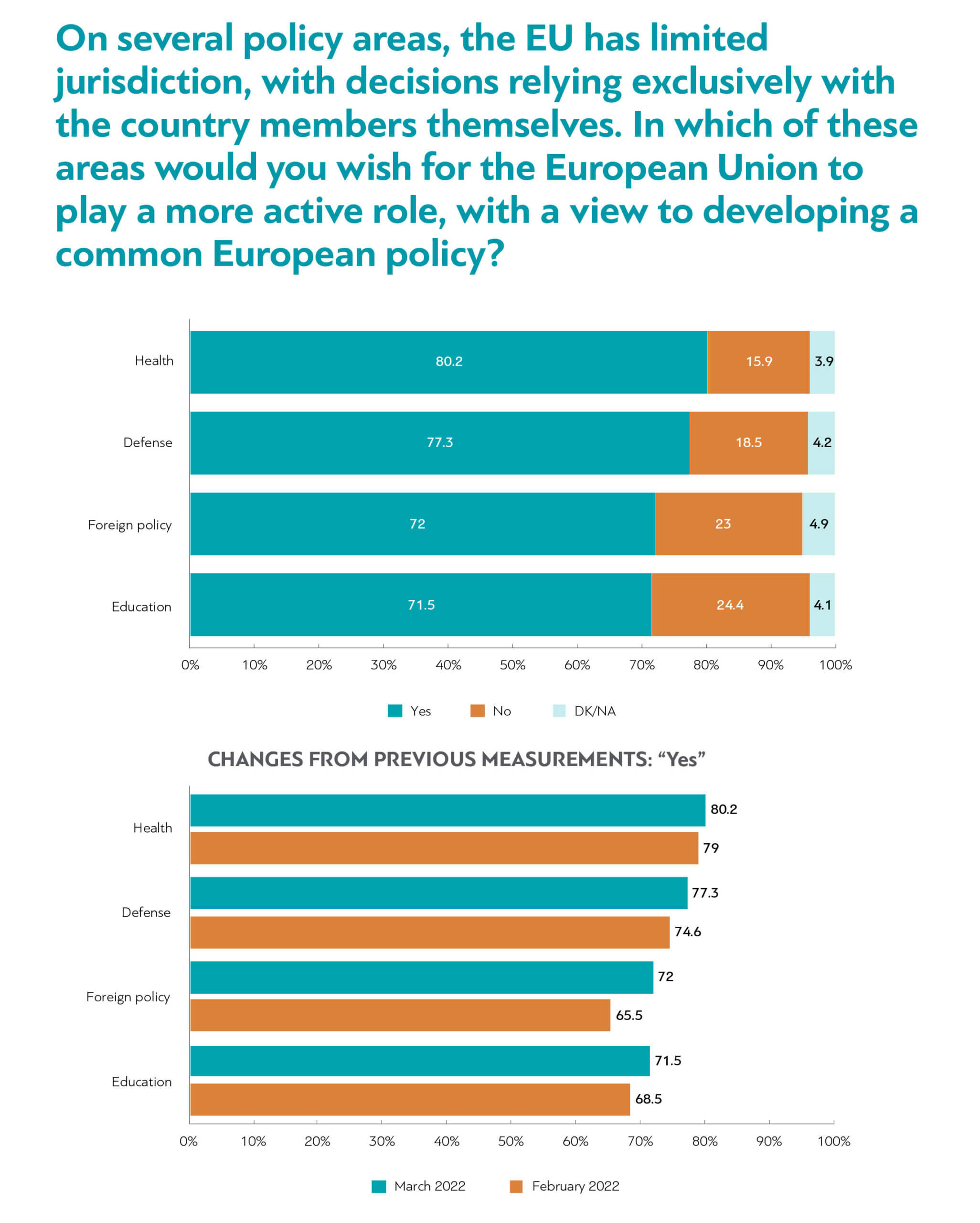
4. Ideology & Religion
In recent years, diaNEOsis has often looked into the important -and inevitable- demographic challenges Greece is facing. In 2019, we decided to add some relevant questions to the "What Greeks Believe" survey. As in 2019, the people we interviewed in 2022 stated that they have an average of 1.38 children -a figure closely approximating the current fertility rate in Greece. However, to the question, "How many children would you like to have ideally", in 2022 the answer was 2.6 (down from 2.8 in 2019). Two useful supplementary findings: the respondents stating that they would like to have more children belong to the 65+ group, while 14.9% of young people aged between 17 and 24 state that they do not want to have any children.
Furthermore, 78.7% of Greek people say that they believe in God -a rate that remains high and more or less stable throughout the years. However, 34.2% of young people aged between 17 and 24, and 21% of the 25-39 cohort say that they do not believe in God.
When we asked the participants to tell us "how close to religion" they feel on a scale from 1 to 10, the average for 2022 was 6.25. In 2019, however, the average was 6.4; and in 2018, it was 6.6. Here too, age is a determining factor, with young people declaring themselves "close to religion" at much lower rates than older generations.
Moreover, to the question "When science and religion clash, who do you think is right", only 10% answered "religion"; while, when asked whether the clergy should be paid by the state or using the Church’s funds, 68% answered "using the Church’s funds". Interestingly, perhaps, the number of people who stated they "never" go to church has almost doubled since 2018 (19.5%, up from 10.2%), although this may be related to the pandemic.
As concerns ideology, just like in previous years the majority of Greeks stated that the label best describing their ideology is "liberalism” (18.9%). A departure from previous years is observed when it comes to the second most popular ideological description: "social democracy" has now slipped to third place (14.1%), with "none of the above" (17%) replacing it in the second place. Among young people aged 17-39, "none of the above" is the most popular choice.
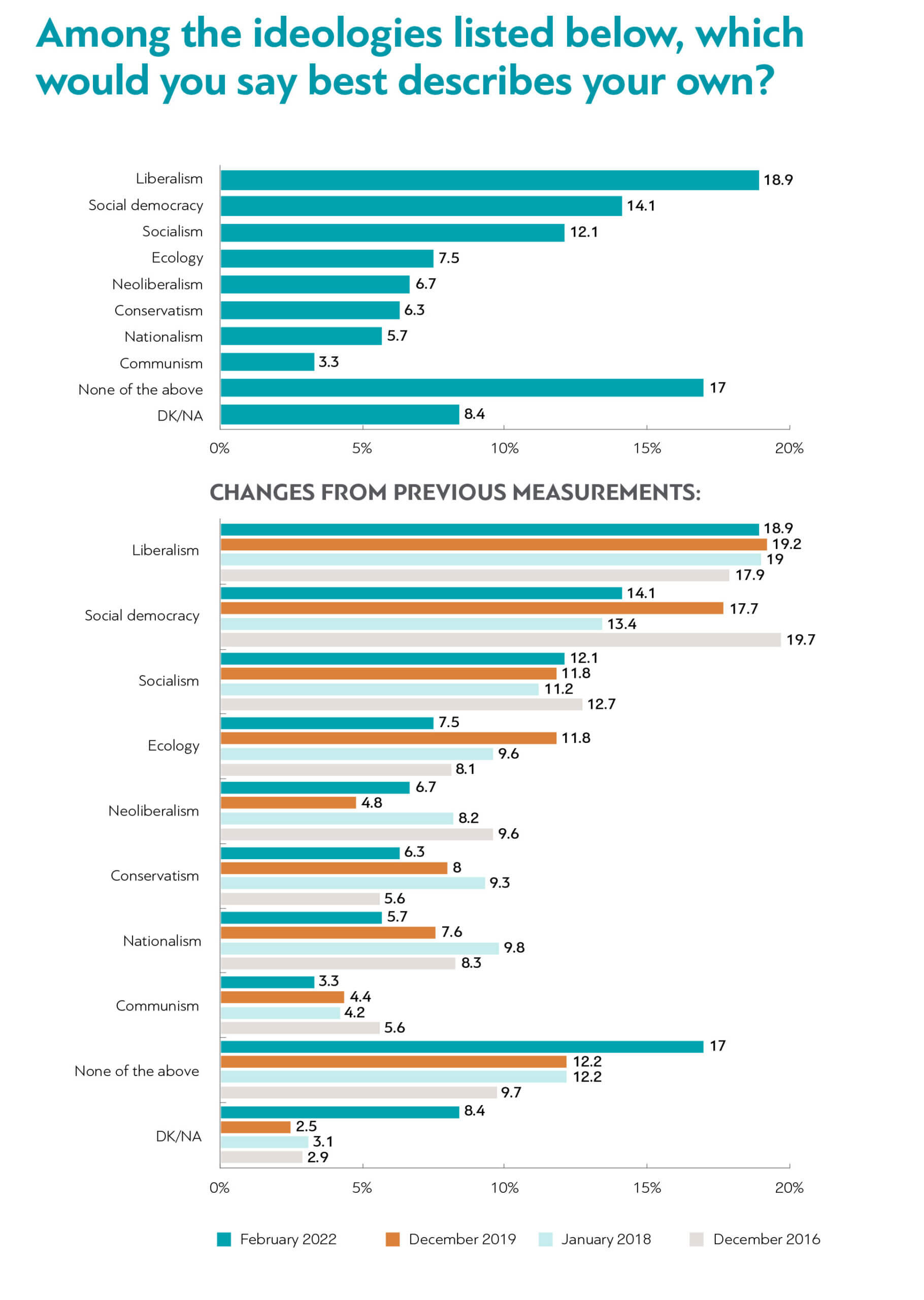
And where do the Greeks place themselves in the ideological spectrum? The answer can be found in the following chart. It is a near-perfect pyramid.
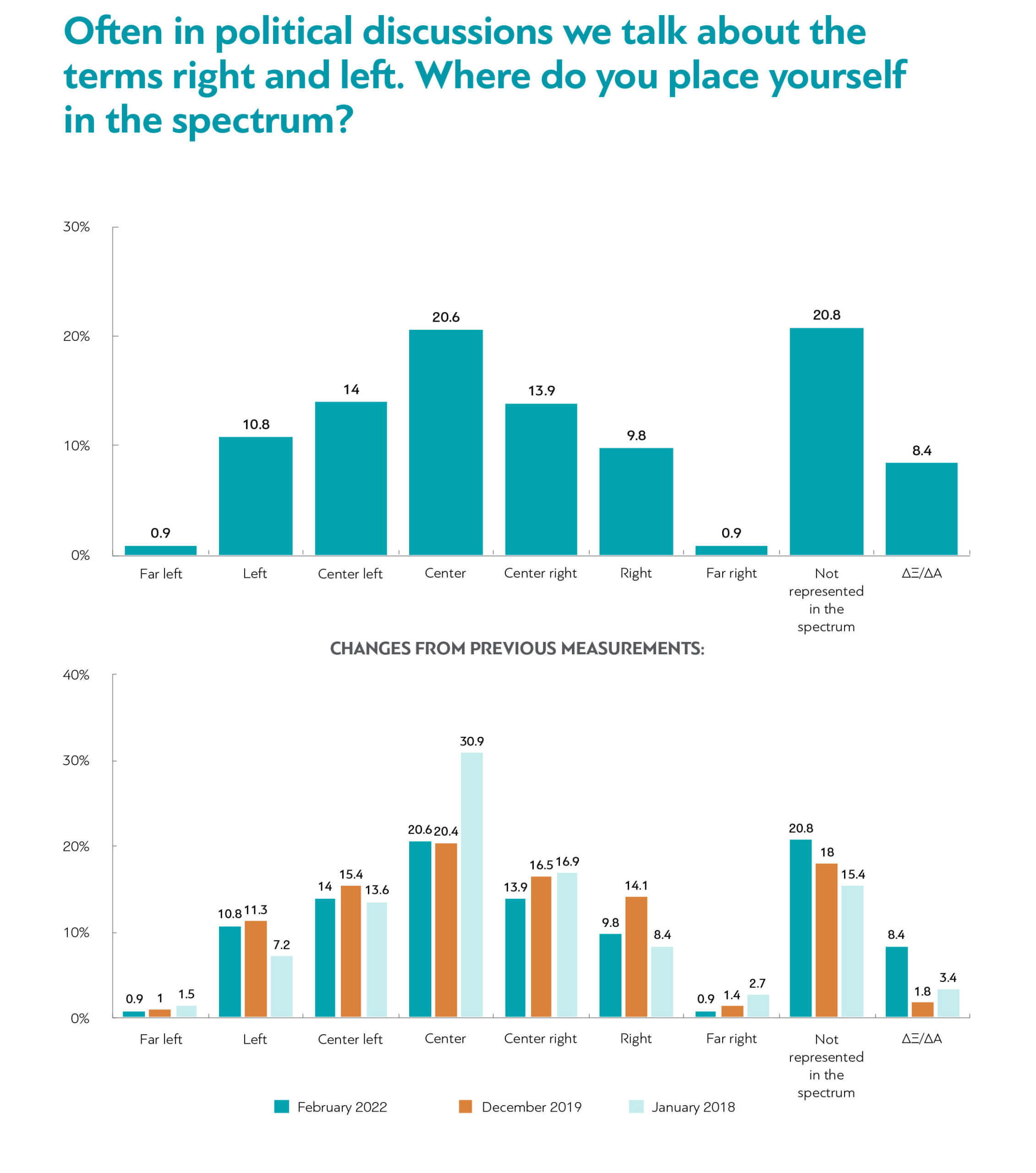
You can read all the survey’s findings (in Greek) here:
SURVEY FINDINGS - PART A (PDF)
OVERVIEW OF FINDINGS - PART A (.PDF)
SURVEY QUESTIONNAIRE - PART A (.DOCX)
SURVEY FINDINGS - PART A (.SAV)
SURVEY FINDINGS - PART A (.XLS)
MAIN REPORT PRESENTING FINDINGS OF PART A - ANALYSIS BY THOMAS GERAKIS (.PDF)
